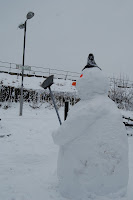 Here's some useful tips to ensure prevent dire consequences of melting snow and thawing ice. If you need home insurance, its not something that we provide, but we can put you in touch with a very good broker. Insurance brokers are invariably more expensive than telephone or online comparisons, but don't forget that they have years of real life experience of claims which is really what the cover is for. I believe that this is money worth paying.
Here's some useful tips to ensure prevent dire consequences of melting snow and thawing ice. If you need home insurance, its not something that we provide, but we can put you in touch with a very good broker. Insurance brokers are invariably more expensive than telephone or online comparisons, but don't forget that they have years of real life experience of claims which is really what the cover is for. I believe that this is money worth paying.One of the dangers that exist in the home during winter weather is burst pipes. The “ escape of water” ,as insurers term it, only happens when the pipes thaw. Many of us are still in the grips of the freeze part of the equation, so now is the time to check those pipes in the loft and those outside taps. Often it’s the joints in the pipes that will be forced apart by the ice so it’s worth a quick look now.
With most, if not all, home policies you will find increased excesses for “escape of water” (usually £250). The following steps should be taken to ensure that the property and its contents are not seriously damaged due to an escape of water.
(If you rent out property why not ensure your tenants have taken suitable precautions otherwise unfortunately you will be the one picking up the bill for the water damage not them?):
• Ensure that pipes and water tanks are well-lagged. Lagging is relatively inexpensive and will frequently cost less than the policy excess charged by your insurer in the event of a claim.
• If the property is unoccupied, even a relatively small leak, if undiscovered, can cause catastrophic damage. Either drain the water systems or if thermostatically controlled, the heating system should be left to operate at a minimum temperature of 15 degrees Celsius.
• If there is a gravity fed water or heating system, one vulnerable area may be the tank in the loft space. If the heating is left in operation it should ensure that some warmth circulates in the loft space.
With most, if not all, home policies you will find increased excesses for “escape of water” (usually £250). The following steps should be taken to ensure that the property and its contents are not seriously damaged due to an escape of water.
(If you rent out property why not ensure your tenants have taken suitable precautions otherwise unfortunately you will be the one picking up the bill for the water damage not them?):
• Ensure that pipes and water tanks are well-lagged. Lagging is relatively inexpensive and will frequently cost less than the policy excess charged by your insurer in the event of a claim.
• If the property is unoccupied, even a relatively small leak, if undiscovered, can cause catastrophic damage. Either drain the water systems or if thermostatically controlled, the heating system should be left to operate at a minimum temperature of 15 degrees Celsius.
• If there is a gravity fed water or heating system, one vulnerable area may be the tank in the loft space. If the heating is left in operation it should ensure that some warmth circulates in the loft space.

No comments:
Post a Comment